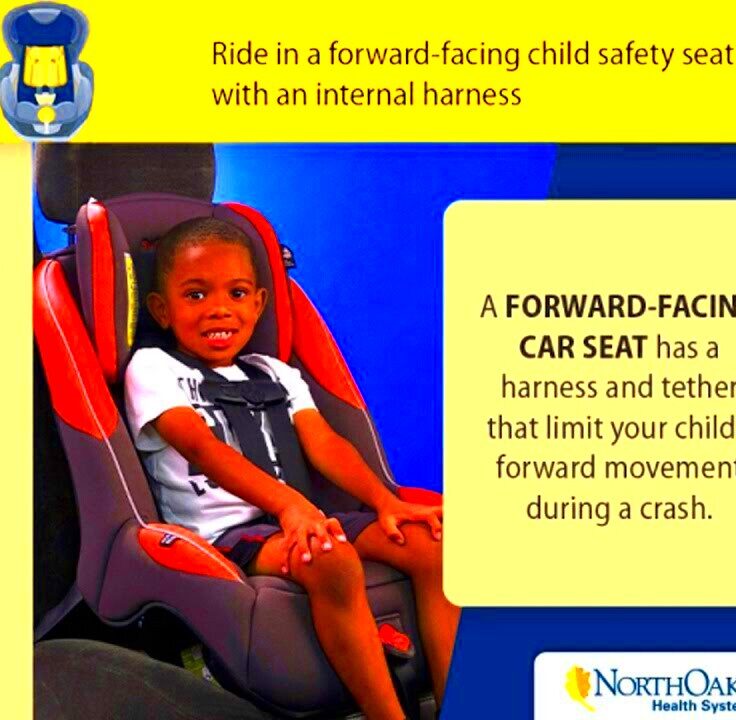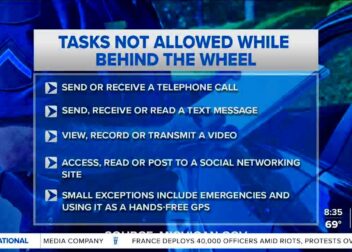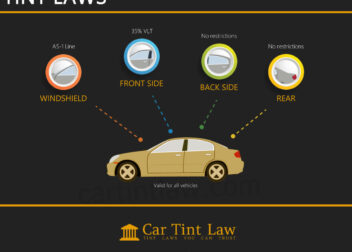Enforcement of Child Car Seat Laws in Louisiana
When it comes to keeping our kids safe while driving Louisiana is strict about child car seat laws. These rules are in place to protect children and make sure that drivers are adhering to the safety measures. As a parent I understand how overwhelming these regulations can be with the different types of car seats and rules to navigate. Getting a grasp on the essentials of Louisianas car seat laws is crucial, for ensuring your child is snug and secure in the vehicle.
In Louisiana, it’s required by law for children under 13 to sit in the back seat and be securely fastened in a car seat or booster seat that suits their age, weight and height. This rule is designed to reduce the chances of injury during an accident. While the law is simple and direct it’s important to stay updated on the details to ensure you follow the regulations and keep your child safe.
Types of Car Seats Required for Different Age Groups
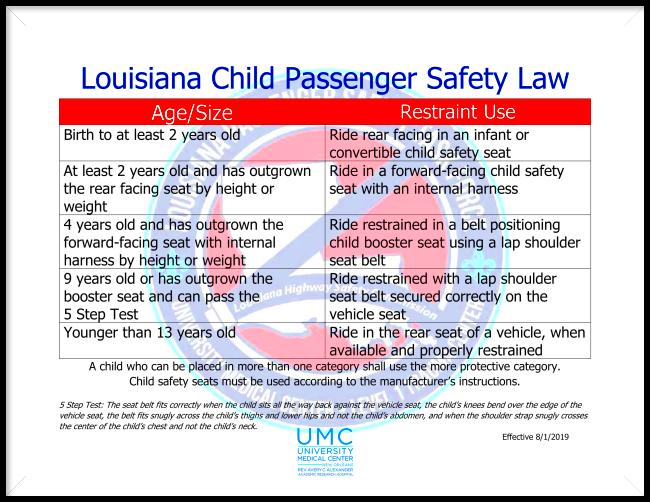
Selecting the appropriate car seat for your little one can be quite overwhelming. However grasping the guidelines for different age brackets simplifies the process. Louisianas regulations specify car seat categories according to a childs age, weight and height.
- Rear-Facing Seats: Infants and toddlers should be placed in a rear-facing car seat from birth until they reach at least 2 years old or outgrow the seat’s height and weight limits.
- Forward-Facing Seats: Once a child surpasses the rear-facing seat limits, they should use a forward-facing car seat with a harness until they are at least 5 years old or reach the seat’s limits.
- Booster Seats: After outgrowing the forward-facing seat, children should transition to a booster seat until they are about 8 years old or reach the vehicle’s seat belt fit.
- Seat Belts: Children who are tall enough to use the seat belt properly, typically around 4’9″ and 9-12 years old, can use the regular seat belt but must still sit in the back seat.
These recommendations make sure that at every step of your childs development the necessary safety precautions are in place. It’s important to consult your car seats manual and stay updated on the current state laws for the most reliable details.
Current Penalties for Non-Compliance
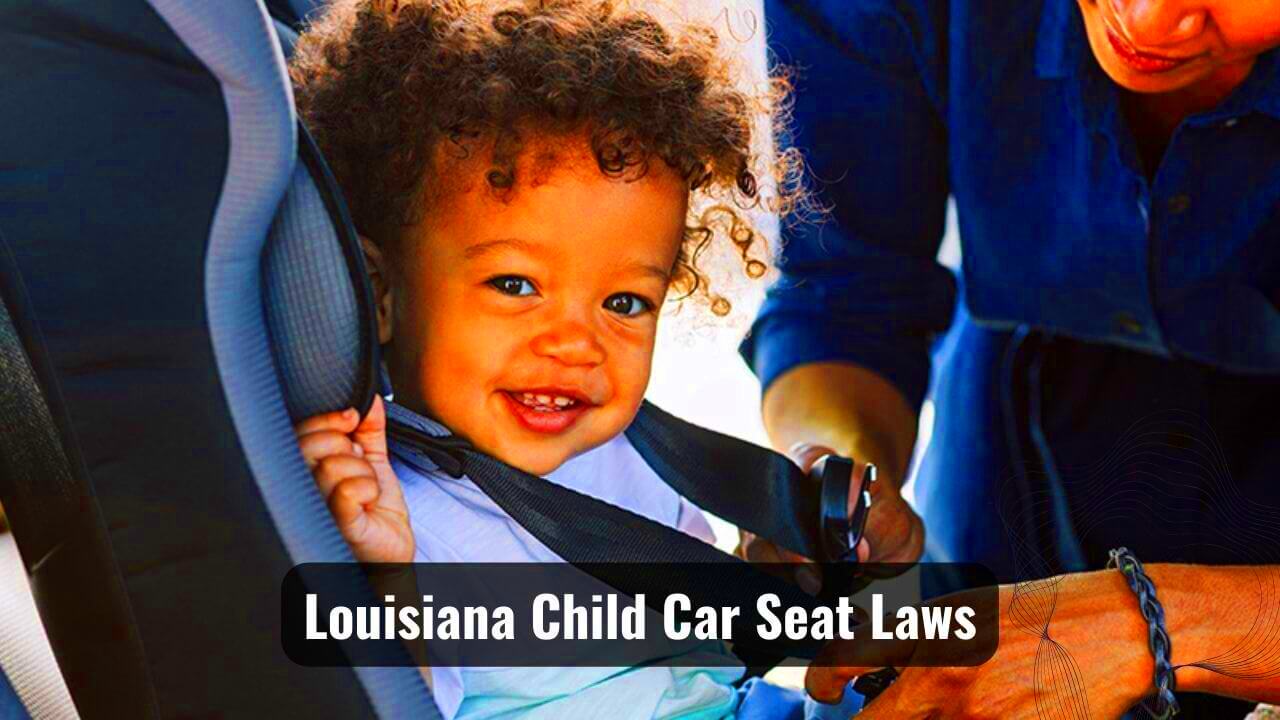
Neglecting the car seat laws in Louisiana can result in repercussions, regarding your child’s well being and your finances. Breaking these regulations may result in fines and additional consequences. As a parent who has dealt with the challenges of ensuring adherence I recognize the importance of steering clear, from these traps.
At present, the consequences for violating the car seat regulations in Louisiana consist of
- Fines: If caught with an improperly restrained child, you may face a fine ranging from $100 to $500, depending on the severity of the violation.
- Points on Driving Record: Repeated violations can result in points being added to your driving record, which may affect your insurance rates and driving privileges.
- Mandatory Car Seat Safety Courses: In some cases, offenders might be required to attend a car seat safety course, which can be time-consuming and inconvenient.
The consequences of these violations go beyond the aspect to emphasize the significance of adhering to safety rules. These regulations are in place to safeguard our children and by following them we play a role in ensuring their security while driving.
How Law Enforcement Monitors Car Seat Use
Ensuring the safety of our kids on the road is a collective duty that falls on both parents and the police. In Louisiana the involvement of law enforcement in checking car seat usage is vital. Based on my observations witnessing officers commitment to upholding car seat safety is not only comforting but also enlightening.
In Louisiana, law enforcement agencies employ various approaches to verify the proper usage of car seats.
- Traffic Stops: Officers often check for proper car seat use during routine traffic stops. If a child is not properly secured, it can lead to a citation and an educational opportunity for the driver.
- Safety Checkpoints: Regularly scheduled checkpoints are set up where officers specifically look for compliance with car seat laws. These checkpoints are an effective way to catch violations and educate parents.
- Community Outreach: Many police departments collaborate with local organizations to hold car seat safety events. These events provide parents with a chance to have their car seats checked by professionals and get advice on proper installation.
Based on what I have seen these actions taken by the police not only assist in identifying rule infractions but also play a role in educating people about the significance of properly using car seats. Its an ongoing endeavor to ensure that our roadways are safer, for our little ones.
Educational Programs and Resources Available
Education plays a crucial role in helping parents and caregivers grasp the intricacies of car seat safety. In Louisiana there are various programs and resources accessible to assist families in making choices. As a parent I have personally found these resources to be extremely helpful in navigating the challenges of car seat regulations and installations.
Here are a few notable educational initiatives and materials that you can access.
- Child Passenger Safety Technician Programs: These programs train individuals to become certified child passenger safety technicians who can assist families in properly installing and using car seats.
- Community Workshops: Local organizations and hospitals often host workshops that offer hands-on training and expert advice on car seat safety.
- Online Resources: Websites like the National Highway Traffic Safety Administration (NHTSA) provide comprehensive guides and videos on car seat installation and safety.
- Local Safety Events: Many communities hold car seat safety events where parents can have their car seats inspected by experts and receive personalized guidance.
These materials are crucial for assisting parents in grasping and adhering to car seat regulations, playing a vital role in safeguarding their kids while driving. By seizing these chances we collectively contribute to the protection of our youngsters.
Recent Changes in Car Seat Laws
Car seat regulations are not set in stone; they change in response to new safety information and advancements in our understanding of child protection. In Louisiana recent updates highlight an increased focus on ensuring the safety of young passengers. By staying informed about these developments I recognize their intention to enhance the safeguarding of our kids during travel.
Here are some of the latest changes to the car seat laws in Louisiana.
- Extended Rear-Facing Requirements: Recent legislation now requires children to remain in rear-facing car seats until they are at least 2 years old or reach the maximum height and weight limits of the seat.
- Booster Seat Regulations: The age for transitioning from a booster seat has been updated to align with national safety recommendations, ensuring better protection for older children.
- Enhanced Penalties: There have been increases in fines and stricter enforcement measures for non-compliance to emphasize the importance of following car seat laws.
Keeping up to date with these changes is crucial for parents to stay compliant and ensure the best safety measures for their kids. By staying informed we can adjust to new safety protocols and continue to protect our young travelers effectively.
How to Ensure Your Car Seat Meets Legal Requirements
Making sure your car seat complies with the law can feel daunting at first. However with some guidance it becomes a lot easier. As a parent I’ve struggled with car seat manuals and safety rules so I totally get the importance of having clear information on these topics. Here’s a straightforward approach to ensure your car seat adheres to Louisianas regulations.
- Check the Car Seat Manual: Always start by reading the car seat’s manual. It contains essential information about weight and height limits, proper installation, and usage guidelines. This manual will provide the specifics needed to ensure compliance with legal requirements.
- Verify the Car Seat’s Expiration Date: Car seats have expiration dates that are usually stamped on the side or back. Using an expired seat can be dangerous and non-compliant with the law. Replace it before it reaches the end of its lifespan.
- Consult State Guidelines: Review Louisiana’s specific car seat regulations to understand the requirements for different age and weight groups. Websites like the Louisiana Department of Public Safety provide up-to-date information.
- Seek Professional Help: Utilize local resources such as certified Child Passenger Safety Technicians who can inspect your car seat installation. They provide valuable assistance and ensure that your car seat is installed correctly.
- Regularly Update Your Knowledge: Car seat laws and safety recommendations can change. Stay informed about the latest updates to ensure your child’s safety and compliance.
Following these measures will prepare you to ensure that your car seat complies with all regulations safeguarding your childs safety and security while traveling.
Common Misconceptions About Car Seat Laws
There are plenty of myths and misunderstandings when it comes to car seat laws and as a parent I’ve come across quite a few too. Its essential to grasp the reality behind these myths to ensure the safety of our kids. Lets set the record straight on some of the misconceptions.
- Myth 1: “Car seats are only necessary for infants.” Many believe car seats are only for babies. In reality, children need to be in appropriate car seats or booster seats until they are 8 years old or reach the height and weight limits specified for seat belts.
- Myth 2: “Once a child outgrows a car seat, they can use a seat belt immediately.” Transitioning from a car seat to a seat belt requires meeting specific height and weight requirements. A booster seat is necessary for proper seat belt positioning until the child is big enough.
- Myth 3: “Car seat laws are the same everywhere.” Car seat laws can vary significantly from state to state. Always check local regulations, as they may have different requirements or penalties compared to other states.
- Myth 4: “The car seat is safe as long as it’s installed correctly.” While proper installation is crucial, the car seat also needs to be appropriate for your child’s age, weight, and height. It’s essential to ensure both factors are considered.
Clearing up these misunderstandings can help you make more choices regarding your childs car seat ensuring their safety and adherence to legal requirements.
FAQ
Q: What is the best way to install a car seat?
The installation of a car seat can be done by carefully following the guidelines provided by the manufacturer. Make sure the seat is securely fastened using the seat belt or LATCH system and check that it doesn’t shift more than an inch sideways or back and forth. If you’re unsure about anything it’s a good idea to get help from a certified Child Passenger Safety Technician.
Q: How can I tell if my car seat is expired?
Car seats usually come with an expiration date marked on the side or bottom. If you can’t locate it, reach out to the manufacturer or visit their website for information using the model number of the seat. In general, car seats have a lifespan of 610 years from the date they were made.
Q: Can my child use a seat belt without a booster seat?
Q: What should I do if I’ve missed a car seat safety check event?
If you weren’t able to make it to a safety check event, don’t worry you can still get your car seat inspected. Just reach out to a nearby Child Passenger Safety Technician or look for community events that provide car seat safety inspections.
Conclusion
Making sure your child is safe on the road is something every parent should take seriously. It’s important to be well informed about Louisiana’s car seat laws and clear up any misconceptions. While navigating these rules can sometimes feel tricky putting in the effort to get it right is priceless. By staying up to date on requirements using available resources and keeping track of changes in the law you can ensure that your child is not only following the rules but also staying as safe as possible. Remember safety is worth every ounce of effort we put into ensuring our little ones are securely buckled up and protected, during every journey.
